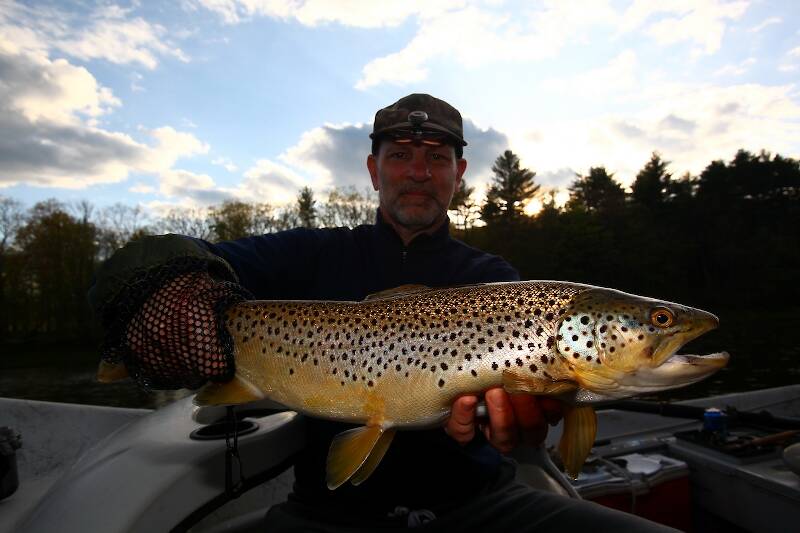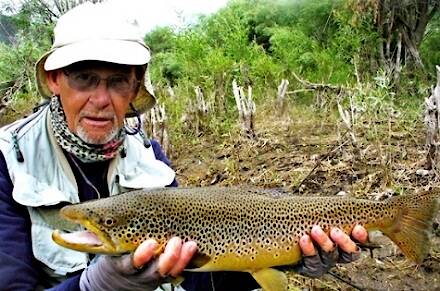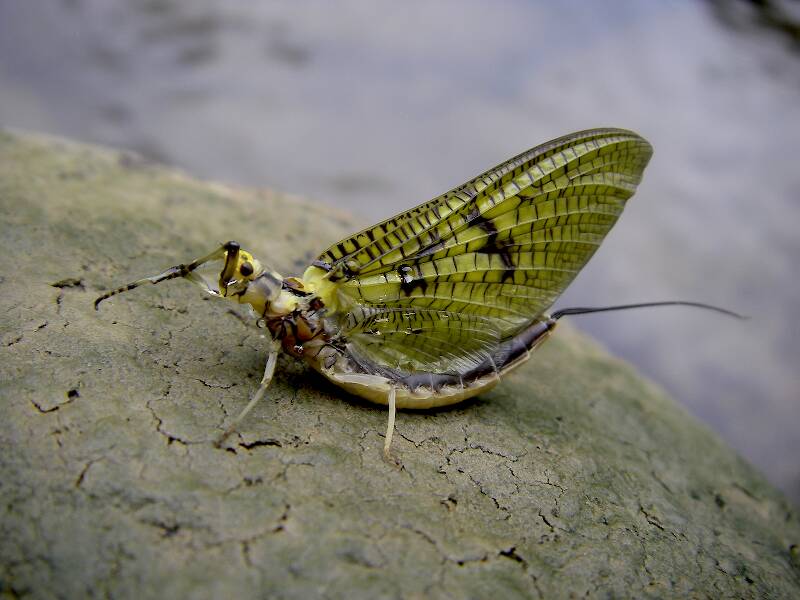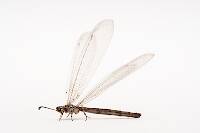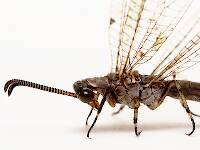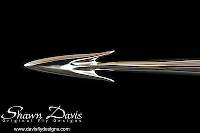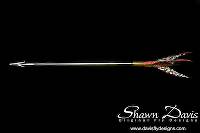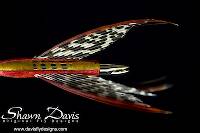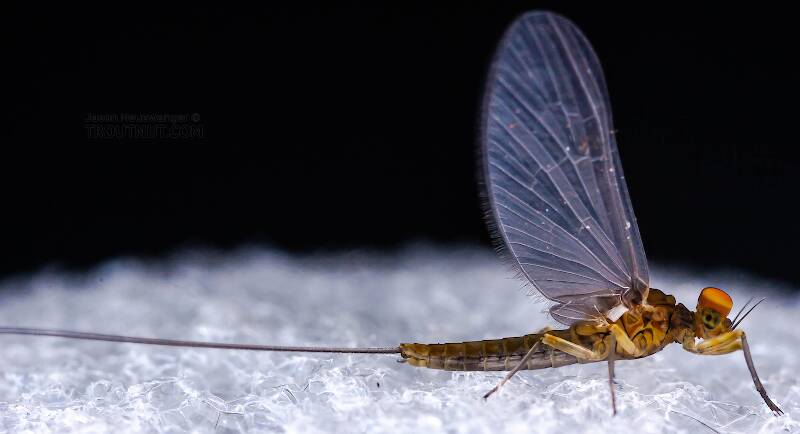
Blue-winged Olives
Baetis
Tiny Baetis mayflies are perhaps the most commonly encountered and imitated by anglers on all American trout streams due to their great abundance, widespread distribution, and trout-friendly emergence habits.
Featured on the forum
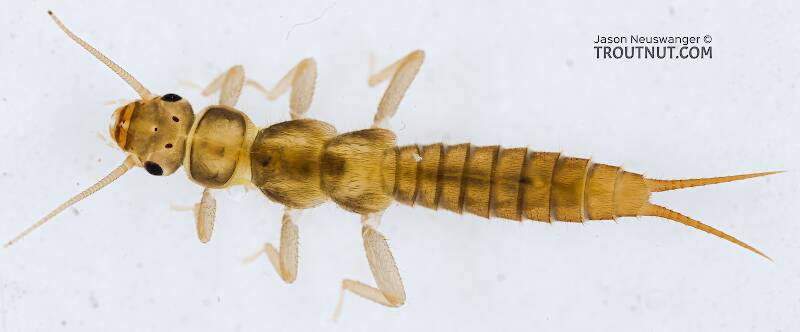
This species was fairly abundant in a February sample of the upper Yakima.

Troutnut is a project started in 2003 by salmonid ecologist Jason "Troutnut" Neuswanger to help anglers and
fly tyers unabashedly embrace the entomological side of the sport. Learn more about Troutnut or
support the project for an enhanced experience here.
Martinlf on Jan 31, 2021January 31st, 2021, 6:00 am EST
OK, this post is primarily just to vent a bit. Watching a Mike Lawson video on fishing the no hackle, I've decided I want to carry some to Montana this summer for a Paradise Valley spring creek I'll spend three days on. After years of religiously avoiding the pattern, I've watched several videos, and reread Swisher and Richards instructions. They tie the fly differently from Lawson, and so far I like their method better. But after several near successes, I just had three disasters in a row trying to attach wings (same fly, repeated attempts). Finally I threw away the tattered mallard slips, cut some new ones, moved my thread a bit and had another somewhat successful attempt. It encourages me that Richards (I think--or Swisher) has said he always warms up on half a dozen before trying to demonstrate the tie. So, as I said, I'm venting a little--and wondering if anyone else has tied and fished this pattern. Dave Hughes says you need to tie a dozen or two to get the hang of it, so I'm on my way, but not there yet.
"He spread them a yard and a half. 'And every one that got away is this big.'"
--Fred Chappell
--Fred Chappell
Wbranch on Jan 31, 2021January 31st, 2021, 10:11 am EST
Louis you've tried to tie a fly that only the fly Gods can tie well. Maybe fifty years ago when "Selective Trout" was published and I was a cocky young whippersnapper of a fly tier I tried tying a couple. My failures were so bad that it was evident I didn't possess the skill sets required to tie that fly.
I've caught hundreds, (thousands?) of difficult, wary, clear water tail water or spring creek trout and have never cast a No-Hackle nor have I ever said "Gee I wish I had some PMD No-Hackles for these tough trout". If you feel compelled to tie some go for it. Or just find a on-line fly seller and buy a couple. Scroll down to the bottom of the page, he sells them in #18 & #20.
https://www.dryflyinnovations.com/categories/no-hackle
I've caught hundreds, (thousands?) of difficult, wary, clear water tail water or spring creek trout and have never cast a No-Hackle nor have I ever said "Gee I wish I had some PMD No-Hackles for these tough trout". If you feel compelled to tie some go for it. Or just find a on-line fly seller and buy a couple. Scroll down to the bottom of the page, he sells them in #18 & #20.
https://www.dryflyinnovations.com/categories/no-hackle
Catskill fly fisher for fifty-five years.
Martinlf on Jan 31, 2021January 31st, 2021, 4:17 pm EST
Matt, I'm finally getting the wings to set right! Most of the time, anyway.
I'm sure, like many things I do to entertain myself with fly tying, that they won't be necessary. But this trip has become my excuse to fully immerse myself in tying some new things. Along with keeping up with some schoolwork (I'm only partly retired, and still have some duties for the college) I'm trying to keep a good schedule of exercise and tying every day, with some time set aside to spend with my wife, who is still working, and doesn't appreciate having a freeloading husband who totally ignores her.
I'm sure, like many things I do to entertain myself with fly tying, that they won't be necessary. But this trip has become my excuse to fully immerse myself in tying some new things. Along with keeping up with some schoolwork (I'm only partly retired, and still have some duties for the college) I'm trying to keep a good schedule of exercise and tying every day, with some time set aside to spend with my wife, who is still working, and doesn't appreciate having a freeloading husband who totally ignores her.
"He spread them a yard and a half. 'And every one that got away is this big.'"
--Fred Chappell
--Fred Chappell
Wbranch on Feb 1, 2021February 1st, 2021, 2:39 am EST
my wife, who is still working, and doesn't appreciate having a freeloading husband who totally ignores her.
I fully understand as my wife has chosen to work part time after her initial retirement. But we have entirely different tastes in TV viewing so while she is downstairs in the TV room I'm upstairs in my man cave tying.
Catskill fly fisher for fifty-five years.
Martinlf on Feb 1, 2021February 1st, 2021, 8:08 am EST
One reason I decided to give the fly a try came from Mike Lawson, who said that it floats exceptionally well even after multiple fish. He compared the no hackle to the comparadun, and says that after the no hackle's wings split up the fly is just as, if not more, effective, with the individual fibers in the no hackle not all that different from the splayed and separated comparadun's deer hair fibers. According to him, the no hackle doesn't get waterlogged nearly as fast as a deer hair fly, due to the water repellency of the duck feathers. I'm going to tie some olives and try them out on Spring Creek this March to see for myself. From what Lawson says about chewed up flies, I'd guess the wings don't have to be perfect anyway--which is a good thing for me. He stresses that the just finished fly with the intact wings is for the fisherman/tyer, and the frayed wing fly is what the fish like.
"He spread them a yard and a half. 'And every one that got away is this big.'"
--Fred Chappell
--Fred Chappell
Troutnut on Feb 2, 2021February 2nd, 2021, 10:49 am EST
I've never had much interest in fishing the no-hackle with so many other interesting, modern options out there. Even if you get the wing profile just right, you're missing the little reflective impressions the legs make in the surface film. Mostly, though, it always seemed like a fly that would be heavily damaged after a single fish. Has anyone fished them enough to see that's not the case?
Jason Neuswanger, Ph.D.
Troutnut and salmonid ecologist
Troutnut and salmonid ecologist
Martinlf on Feb 2, 2021February 2nd, 2021, 11:42 am EST
I've also avoided them, for some time, but they were recommended for PMD's on Nelson's Spring Creek in the Paradise Valley, which I'll fish in July, so I decided to give them a try. I also have tied some olives for early fishing in Pennsylvania, so I can give a report in a couple of months. In part, I just wanted to see if I could tie them. They're not impossible, and after a while, as with other things, one gets the hang of it. I tied some size 20's yesterday, and they came out OK. As for the fragile wing--which was one reason I hadn't bothered with them--Lawson claims they fish as well, or better, after the wing shreds, and his discussion made sense, so that in part led me to give them a try. They may end up being a fly I save for fish that won't eat anything else.
"He spread them a yard and a half. 'And every one that got away is this big.'"
--Fred Chappell
--Fred Chappell
Martinlf on Feb 3, 2021February 3rd, 2021, 1:33 am EST
I've been thinking more about Jason's comment about legs above, and recalled a mid-August day on the Delaware where I met a guy who was catching more fish than anyone around him. Although many Delaware anglers use comparaduns and cdc or snowshoe emergers with no hackle, he was using a somewhat sparsely hackled Catskill dry olive pattern with a single synthetic post wing. His explanation was that the hackle did create the illusion of mayfly feet. I also note that several buddies' favorite mayfly duns also use sparse hackle in thorax patterns. However, a number of flies that are commonly used on difficult fish have no hackle, including comparaduns (deer, CDC, and synthetic winged) and various CDC, deer hair, and snowshoe winged emergers, and hence have no illusion of legs or feet. Furthermore, the more heavily hackled Catskill flies that were popular in past decades have generally fallen out of favor for difficult trout on the flat water of hard fished spring creeks and tailwaters, though some still recommend them in riffled water. I'm guessing different elements of different flies produce different illusions or triggers. For some flies it may be the wing, for others the legs, while a shuck or body form may be the trigger. Possibly combinations of these work synergistically at times. In Maylfies Knopp and Corimer discuss this idea in their chapter on "The Mayfly and its Imitation," with a specific discussion of multiple triggers in the R.S. Quad fly design. Scientific studies of these "triggers" seem almost impossible for most of us, as we typically are more interested in catching a fish as we cycle through different flies, and success (or failure) may depend on other variables such as changes in tippet, changes in position, changes in casting, changes in the fish's position or pattern of eating, etc. rather than on fly design, however much we might want to believe the new fly led to a fish in the net--or lack thereof.
"He spread them a yard and a half. 'And every one that got away is this big.'"
--Fred Chappell
--Fred Chappell
Wbranch on Feb 4, 2021February 4th, 2021, 2:51 am EST
Hello Jason,
I haven't fished any since the late 1960's while fishing Armstrong & Nelson's. I never saw any significant advantage to No-Hackles over say Compara-duns or properly tied Thorax duns. Besides like you mentioned after one fish, or excessive false casting, the duck slip wings came apart and the wings were just a bunch of quill barbules. I never learned to tie them, or cared enough to learn, I'd get a couple from one of my buddies in Montana. They can't be that productive since I rarely see them for sale at fly shops or on-line fly sellers.
Has anyone fished them enough to see that's not the case?
I haven't fished any since the late 1960's while fishing Armstrong & Nelson's. I never saw any significant advantage to No-Hackles over say Compara-duns or properly tied Thorax duns. Besides like you mentioned after one fish, or excessive false casting, the duck slip wings came apart and the wings were just a bunch of quill barbules. I never learned to tie them, or cared enough to learn, I'd get a couple from one of my buddies in Montana. They can't be that productive since I rarely see them for sale at fly shops or on-line fly sellers.
Catskill fly fisher for fifty-five years.
Martinlf on Feb 4, 2021February 4th, 2021, 6:54 am EST
I firmly believe that a good drift and the right size are the two most important things with dry flies, with fly design and close to exact color also playing a part more or less. It's been interesting learning to tie these, and I look forward to fishing them, but if they don't seem to have any advantage over an easier fly to tie, they may just end up as an interesting phase for me. Several locals very familiar with Nelson's recommended them, and some others I trust have touted their usefulness, hence the experiment. I'm not sure one doesn't see them often because they aren't productive; I suspect the difficulty in tying them, and the change in aesthetics and perceived loss of effectiveness due to the fragility of the wing accounts for at least part of their scarcity. I'll have a lot more of other patterns for the stream, though, especially some modeled on CDC comparaduns and parachutes a guide for the stream tied for me. But if I have a fish that won't eat anything else, I'll sure give them a try. A few years back I had a big fish on Penns that ignored everything I threw over it for at least an hour. Defeated, I went home and tied one of Galloup's bent hook single wing cripple/spinners. The next day I went back and threw it over the fish, which was rising in a very specific and well defined spot. It ate on the first drift. Who knows if it actually was the fly, or some other variable. It was the biggest fish I've ever landed on a dry fly, and I've also tied up some of the Galloup cripple/spinners for Nelson's. I do believe that sometimes it helps to show a fish a fly it hasn't seen before. Perhaps the scarcity and lack of popularity of a fly may be a benefit at times. Thanks to all for the comments; they have been useful.
"He spread them a yard and a half. 'And every one that got away is this big.'"
--Fred Chappell
--Fred Chappell
Wbranch on Feb 4, 2021February 4th, 2021, 11:40 am EST
Louis,
If they are crazy productive you should save ones that are still pristine to just keep in your fly box. Guys always like to "Oh & Ah" unique and pretty flies.
You may be right in that they are more difficult to tie therefore fly providers, or private tiers, are going to avoid tying them in favor of easier to tie but as effective other flies.
It's been interesting learning to tie these
If they are crazy productive you should save ones that are still pristine to just keep in your fly box. Guys always like to "Oh & Ah" unique and pretty flies.
You may be right in that they are more difficult to tie therefore fly providers, or private tiers, are going to avoid tying them in favor of easier to tie but as effective other flies.
Catskill fly fisher for fifty-five years.
Troutnut on Feb 8, 2021February 8th, 2021, 5:54 pm EST
However, a number of flies that are commonly used on difficult fish have no hackle, including comparaduns (deer, CDC, and synthetic winged) and various CDC, deer hair, and snowshoe winged emergers, and hence have no illusion of legs or feet.
I've always seen the "wings" on comparaduns and their CDC/snowshoe/poly yarn counterparts as being wings & legs in one, because they fan out enough to leave some impressions in the water on the sides. I would guess these imitate legs as well as most hackle styles do (except maybe thorax), though it would be interesting to see comparison photos from below the water.
Defeated, I went home and tied one of Galloup's bent hook single wing cripple/spinners. The next day I went back and threw it over the fish, which was rising in a very specific and well defined spot. It ate on the first drift. Who knows if it actually was the fly, or some other variable.
You've probably heard me pitch that fly before, but the Galloup's cripple is an all-time favorite of mine for both duns and spinners. I rarely fish anything else for spinner falls.
I've also started using some of his "found link" mayfly pattern, although often modified with more imitative body materials. They're sort of also in that comparadun-like style, but with poly yarn legs that stick out to the sides like a spinner under a deer hair wing. I've had some good luck with these so far and would recommend adding a few to your box to try at least.
Jason Neuswanger, Ph.D.
Troutnut and salmonid ecologist
Troutnut and salmonid ecologist
Martinlf on Feb 9, 2021February 9th, 2021, 5:34 am EST
Interesting. It helps that so many of these patterns are available on YouTube. I hadn't heard of the "Found Link" pattern, and watched Galloup's video with interest. Galloup is innovative, and shares little tips to make tying go more smoothly. The zlon "wing" may simulate legs, and if so this pattern has something in common with Lloyd Gonzales mayfly duns that use hi vis for legs. Galloup's title, "Found Link," may be in response to Mike Mercer's "Missing Link" fly. One of my buddies is in touch with Mercer, who sent him some Missing Links last year. One day a little black Missing Link worked on some very educated fish that my buddy could not catch with anything else. He gave me one of the flies, and I tied up some more for him. I've been meaning to tie some more of these in different colors. Mercer uses them on mayfly hatches as well as caddis. My buddy's fish were eating midges. So many flies to tie, such little time. Anyway, here's Mercer's fly:
https://www.google.com/search?q=missing+link+fly+pattern&rlz=1C1GCEB_enUS848US848&oq=missing+link+fly&aqs=chrome.1.69i57j0l2j0i22i30i457j0i22i30l5.6902j0j7&sourceid=chrome&ie=UTF-8#kpvalbx=_UeEiYM2-M6K3ggel75fwCQ10
https://www.google.com/search?q=missing+link+fly+pattern&rlz=1C1GCEB_enUS848US848&oq=missing+link+fly&aqs=chrome.1.69i57j0l2j0i22i30i457j0i22i30l5.6902j0j7&sourceid=chrome&ie=UTF-8#kpvalbx=_UeEiYM2-M6K3ggel75fwCQ10
"He spread them a yard and a half. 'And every one that got away is this big.'"
--Fred Chappell
--Fred Chappell
Troutnut on Feb 9, 2021February 9th, 2021, 7:39 am EST
Galloup's title, "Found Link," may be in response to Mike Mercer's "Missing Link" fly.
It is. I know I've seen him say that somewhere -- maybe the video?
Jason Neuswanger, Ph.D.
Troutnut and salmonid ecologist
Troutnut and salmonid ecologist
Crepuscular on Feb 15, 2021February 15th, 2021, 9:08 am EST
It's been a while since I've been here, but after reading this thread, I figured I'd give my 2 cents. . The No Hackle Duns are still very much in use and are an productive fly. Especially around Island Park. I have had good success with them on the upper Delaware System too. It does take some time to learn to tie them and I think Lawson makes it look harder than it is. True, the wings don't last, but that's not a big deal to me. If I have an ace in the hole when I need it, I'm glad I have it. I may only need one. Sometimes it's the No Hackle Dun, sometimes it's a Galloup's Cripple, sometimes it's something else. Personally I like the idea of a wing silhouette and legs. Who knows, once a No Hackle Dun wing separates, maybe you are getting something like a cripple that has both. Sometimes I think it's just showing them something they haven't seen before but has the right silhouette, rides in the right spot on the surface and the presentation is timed well to a particular fish's feeding behavior.
Eric
Eric
Quick Reply
Related Discussions
Topic
Replies
Last Reply
6
Nov 4, 2011
by Dinerobyn
by Dinerobyn
Re: Three Trouble Makers at the Midwest Fly Fishing Expo the past weekend
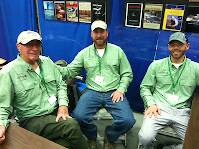
In the Photography Board by Oldredbarn

In the Photography Board by Oldredbarn
3
Mar 11, 2014
by TNEAL
by TNEAL


